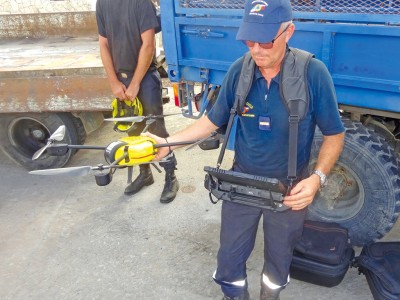As Irma moves away, soldiers and firefighters from the civil security deploy on the French side to help the population. In the early hours, reconnaissance is done on foot and in vehicles. As of Thursday morning, the second detachment of eighty men arrives. Nearly 140 sappers and soldiers are now on the ground. "We have divided Saint-Martin and built up teams," explains Captain Joël (the family name cannot appear in the media, editor's note), who is responsible for Quartier d'Orléans and who the day before carried out evacuations until 22 hours. “When people came to tell us that they had no news of others, we went to see. We checked all the addresses we were given, we found no one buried under the rubble. Often those wanted were at friends' homes or a little further down the street, ”said the captain.
As the winds decrease, the rescuers can use their drones to get a better estimate of the damage. "In less than ten minutes, we have a view," they say. They have several types of drones which are piloted by dog handlers, including one capable of detecting human presence under debris. They fly the machines to estimate the condition of the roofs. They notably made a video of the roof of the Beach hotel. The time saved is enormous in order to be able to initiate the first interventions.
Many firefighters are also mobilized on the roof of the Mercure hotel for the tarpaulin. “It was a hotel which had just been renovated and which had benefited from public subsidies, in particular European aid. We have to help it restart. It is important to be able to revive economic activity. Today we are there, tomorrow we will be in another establishment, in another company to help it, ”comments Prefect Anne Laubiès, who visited there last week. "We must put oil in the wheels", for his part loose Lieutenant Colonel Vincent.
In addition to distributing tarpaulins sent by the state, the military is busy distributing water to the population. In three weeks, 1,3 million bottles of water were donated. "We are distributing around 150 liters per day, this week we have dropped to 000 liters and next week we should distribute 50," said Lieutenant-Colonel Vincent, who estimates the need for drinking water to be another month. The bottles are transported at State expense by barge and the places of distribution communicated by the prefecture and the community.
In addition to the distribution of drinking water, civil security ensures the production of sanitary water (not potable) thanks to a machine that it has itself brought. The soldiers have two machines, one to produce from fresh water and a second from sea water. "Here, we took the reverse osmosis system, that is to say seawater desalination ”, explains Staff Sergeant Benoît. The machine is installed on a truck parked on the slab of the old lolos in Grand Case, "an ideal location due to its proximity to the sea and the space around it". A tarpaulin with a capacity of 10 liters is placed on the ground for storage. "We put chlorine in it which allows us to keep it longer", explains the chief sergeant. The military distribute between 000 and 4 liters per day. "For the past two days, we have seen fewer people because the water has come back to the tap," said the chief sergeant. The population can come throughout the day with their jerry cans to fill them. It can also recover pockets of water.
Right next to it, a stand has been set up to distribute food. Other teams take turns to supply food distribution points. They collect them from the port in the Frigodom building, which they also emptied of all the spoiled and cleaned food.
This week, the distribution of food should decrease and the men deployed on another mission, that of helping vulnerable people (elderly, sick, single women with children).
Source: www.soualigapost.com
To be continued in our next editions:
Civil security :
"Something terrible" (3/4)
A real logistics challenge (4/4)
6,719 total views













No comments